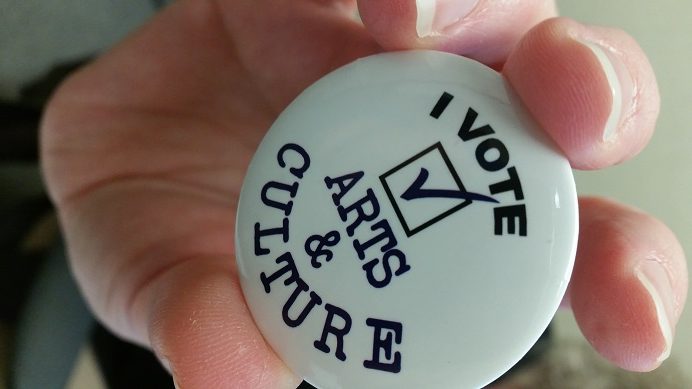by Katie Wilde
Editorial by Jennifer Joiner
This is a two-part article. The first half provides information on the current election, including: why the arts should matter to voters and candidates, how to take action as a citizen, parties’ positions on arts and culture, and the local candidates’ contact information.
The second part is an editorial by local artist Jennifer Joiner, which provides some insight into the issues facing artists and the sector at large.
The Canadian Arts Coalition has put together a Toolkit to help any and all citizens engage with this issue, and to help bring arts issues to the forefront of the election and build awareness in the politicians who represent us. The toolkit offers useful contact information, sample letters, social media primers, arts facts, and is very easy to use.
What can I do?
- Make sure you’re registered to vote, know where your polling station is, and make plans to vote early or get to your station on time. http://www.elections.ca/home.aspx
- Know your candidates and their parties’ positions on the arts. We’ve summarized the responses gathered by the CAC below.
- Ask your MP candidates to commit to the arts, to fight for culture in the federal budget, and to speak up to their party leaders on your behalf. Send them a letter, email, or tweet (samples provided in toolkit) to remind them that, if they are to represent you, they should represent your values – and you’ve made them aware that arts and culture matter to you.
Not sure how to start the conversation? Here are some questions you can ask your candidates.
Help yourself to this social media primer from CAC.
The Canada Conference for the Arts also provides information, infographics, tips, and ArtsVote buttons. We have some in the office, come pick them up free during office hours!
Think the arts are just a ‘nice-to-have’, and not an important election issue? Could you say the same about issues of economics, health, society, children, or public safety?
Think again.
Culture is an ECONOMIC issue.
- The arts made the government three times as much money in taxes as they spent on the arts.
- GDP: Culture is a larger contributor to the GDP than the accommodation and food industry, and the agriculture and forestry industry.
Culture is an issue of PUBLIC SAFETY.
- You are far more likely to become a victim of local crime than terrorism. Investments in your own community often depend on federal arts funding to create and sustain arts programs for criminal offenders, at-risk youth, and victims of crime. These programs help to foster positive behaviour and coping skills, creating a safer Canada for all.
Arts Education for At-Risk Youth results in Better Academic Outcomes, Higher Career Goals, and More Civic Engagement: http://arts.gov/news/2012/new-nea-research-report-shows-potential-benefits-arts-education-risk-youth#sthash.1i6AgiLm.dpuf
“According to the 2009 GSS, about 7.4 million Canadians, or just over one-quarter of the population aged 15 years and older, reported being a victim of a criminal incident in the preceding 12 months.” “In 2013, four individuals were arrested on terrorism-related charges in Canada… Both alleged plots were detected sufficiently early that there was never a risk to the public.” http://www.statcan.gc.ca/pub/85-002-x/2010002/article/11340-eng.htm#a
Culture is an issue of CHILDREN, education, and our future.
- Citizens who are children now “will soon be leading Canada’s growth in terms of cultural, social and economic development”
- more funding in the arts means parents and schools will have more opportunities, and be better able to afford to give children formative experiences in the arts which instill:
- discipline
- learning skills
- better brain function (cognition, language, math, critical thinking)
- teamwork
- responsibility
- Mitigate the ‘risk’ in ‘at-risk youth’, and give every child a chance
http://www.canadianartscoalition.com/resources/children-and-the-arts
http://www.hillstrategies.com/content/preparing-students-next-america-benefits-arts-education
Culture is an issue of HEALTH.
People who attend arts activities have been shown to be significantly healthier,(4) have lower anxiety and be less subject to depression. (5)
- preventative measures reduce the burden on our health care system
- happier, healthier individuals contribute to more positive family, school, and workplace environments
http://jech.bmj.com/content/early/2011/05/04/jech.2010.113571 http://www.hillstrategies.com/content/arts-health-and-well-being
http://www.hillstrategies.com/content/arts-and-individual-well-being-canada
Culture is a SOCIAL issue.
“The arts are how we speak to each other across our vast geography. Our arts and cultural organizations express the Canadian values of diversity, tolerance and multiculturalism. They are a critical building block as Canadian children build shared citizenship and understand one another.” http://www.canadianartscoalition.com/resources/society-and-the-arts
The arts are a critical avenue to
- Indigenous voices
- understanding our history, our identity, and informing the direction of our future
- free speech and social justice
- multiculturalism
- providing a support system for people living with any degree of poverty or mental health issues
“There are many ways to find out about a given party’s stance with regards to arts and culture. You may explore their past policies, you may scan past statements. You can also ask direct questions to parties and candidates.”- CAC
The Canadian Arts Coalition has provided a summary of party responses to five important questions about the future of arts in Canada, which we repost with permission here. We have inserted the name and contact information of each local candidate below their party. This information along with the toolkit is available to help you reach out to the candidates.
The Green Party’s Strong Communities platform was released on September 9. Its main commitment is to reverse the $117-million cut to CBC/Radio-Canada, and to invest an additional $168-million and $315 million every year thereafter to rebuild the CBC and Radio-Canada’s local coverage and capacity. Other elements of the platform are more detailed the Green Party’s answers to the Coalition’s questionnaire.
In its answers to the Coalition, the Green Party supports all recommendations from the Coalition’s last pre-budget brief, including a gradual increase of the Canada Council for the Arts’ Parliamentary appropriation. The Green Party commits to increase the CBC budget and guarantees funding for the National Film Board and Telefilm Canada. The Green Party also proposes to explore tax measures for professional artists and to guard our cultural sovereignty in trade negotiations.
In addition to answering the Coalition’s questionnaire, the Green Party also provided a short video from their spokesperson on Arts, Culture, and Heritage, Jo-Ann Roberts.
Gord Miller – Green
http://guelphgreens.ca/
https://www.greenparty.ca/en/riding/2013-35032
[email protected]
519-994-4673
Conservative Party of Canada
The Conservative Party has not yet provided answers to the Coalition’s questions. If you talk to your Conservative candidate, consider asking him/her about the Coalition’s questions.
For more information, you may also:
- Consult the Analysis of the Federal Budget – it provides a factual overview of the party’s track record in the last few years, while it formed the government;
- View the “Netflix Tax” video statement of the Conservative Party;
- Read the Conservative’s announcement regarding funding to support local museums (dated, Sept. 6).
Gloria Kovach – Conservative
http://gloriakovach.ca/contact/
http://gloriakovach.ca/
New Democratic Party
In its answers to the Coalition’s questions, the NDP says it is aware of the need to invest in the Canada Council and in market access, and intends to clarify its positions in its full platform. The NDP’s answer on the CBC is quite elaborate: it includes a commitment to cancel the $115 million cuts and iterates the party’s track record with regards to support to the CBC.
.
For more information, you may also:
- View video interviews with candidates Irene Mathyssen and Nathan Cullen, produced by the Independent Media Arts Alliance in October 2014;
- Read NDP candidates’ positions on Arts and Culture (Paul Dewar, Peggy Nash, and Megan Leslie – as of August 25).
Andrew Seagram
http://andrewseagram.ndp.ca/
519-341-3641
500 Willow Road
http://andrewseagram.ndp.ca/contact
Liberal Party of Canada
The Liberal Party promised $380 million in its cultural platform, released, on September 22. The Liberal Party proposes to double investment to the Canada Council for the Arts to $360 million per year from $180 million, to invest $150 million in new annual funding for CBC/Radio-Canada, to restore international cultural promotion programs, and to increase funding for Telefilm Canada and the National Film Board by $25 million per year.
In its answers to the Coalition’s questionnaire, the Liberal Party proposes to exercise leadership in market development, in partnership with Canada Council for the Arts and targeted departmental programs. It proposes to undertake a review of the Broadcasting Act and the Copyright Act. The Liberal Party also has detailed plans for the CBC, including the reversal of the $115-million cuts. Other areas of interest for the Liberal Party include cultural infrastructures, fiscal measures for artists, the Copyright Board, the audiovisual sector, Library and Archives, museums, as well as a commitment to re-establish the long-form census.
.
For more information, you may also:
- View a video interview with Stephane Dion, produced by the Independent Media Arts Alliance in October 2014;
- Listen to an interview with Justin Trudeau on Q in October 2014;
- Watch videos of Justin Trudeau on culture and the CBC [in French], released in June 2015.
Lloyd Longfield
https://lloydlongfield.liberal.ca/
519.822.5693
[email protected]218 Silvercreek Parkway North
Unit 21
Guelph, ON
N1H 8E8
Tonight, the local candidates debate hosted by the Guelph Chamber of Commerce will be held at Cutten Fields from 6-9 p.m., doors open at 6:30 p.m. This event is free and open to the public. It will also be broadcast live on Rogers television. http://www.guelphchamber.com/attend/event_calendar/#id=1493&cid=119&wid=701
Artists are the professionals bringing to society all the benefits outlined above. Let’s remember how difficult it can be to make a living in this field, and why we need the support of our federal government to sustain the health of the individuals working in this broad sector. Below is an editorial from a local artist, who shares her perspective on the issue of government support for artists.
“Creative people exist in every corner in society. We admire exploration of the hypothetical. We enjoy seeing successes that come from figuring out new ways of working. Societal support of the arts through government is an engine for opportunities for creative minds to realize explorations. Yet arts support is less sustained than for other sectors, such as industry, health, and science, where results seem more pragmatic. This appeal to politicians is to show support for the arts sector is also pragmatic.
We know we need our poets, songwriters, musicians, dancers, filmmakers, composers, writers, painters. What is the nature of that need? A musician once said to “Sing for the song.” It is everything. And so a song is invented, or reinterpreted, and lyrics can call back old days or give meaning to today. The song can be beautiful, terrifying, comforting, joyful, or melancholic. We think of song as culture, an expression of us. We derive our sense of our place in the world from our culture.
We get a lot out of what artists do. We go to concerts, plays, movies, art shows, museums. But as much as we appreciate artists, the majority are primarily supported by their families and jobs outside of their training. Very few can make a livable income from their art, even when able to derive some income from collectors, fans, occasional grants, fellow artists, and the few arts jobs available. Realistic support for the arts must be both a public and private matter. Consistent government support for cultural institutions and directly for individual artists is hugely important. Artists are workers in a money-economy. Artists’ rights are to be recognized:on the right to be paid, on decent wages, on copyright, on small business assistance.
Making it in Canada is possible but there are some significant barriers, such as the too-small secondary market (even primary) for visual artists, or the poor investment and distribution/market of feature films. Canadians rarely see their stories in popular film, or even documentaries now. Well-known musicians can be busy performing in a good year, win awards, and still only just manage to make a modest living. Government support for such institutions as opera, ballet, the symphony, art museums, and post-secondary art departments do keep many Canadian artists employed and engaged with their fields, which always requires an international give and take to be at the top of their art. Just as for the elite athletes in the recent Pan Am Games, Canada is wealthy enough and interested enough to help talented people train to a high level in the arts.
Canada has many good novelists, poets, musicians, painters, sculptors, dancers, actors, playwrights, filmmakers – most making ends meet with outside jobs, or living low, but producing. Artists tend to be even better with more sustained careers. Necessary to a high level of work today is to be engaged beyond our borders. But we are nevertheless a secondary nation still looking to New York and other major arts centres who set the pace. For example, too few of even our established, well-known visual artists can sell to collectors outside our country. To engage with and to compete in an international context, Canadian artists need their government to bump them up into view.
The appeal to you, our political representatives, is to understand and recognize the arts as well as you do other sectors in our country. It is an industry of course, generating income directly and also in tourism. The arts help us understand each other, to live in equanimity, and also to create a Canadian way of interacting on this globe. Please remember and act with the knowledge that the arts in Canada are vulnerable.”
Jennifer Joiner, Artist








